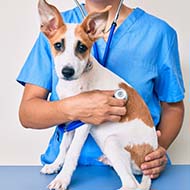
Summit will consider why vets move away from clinical practice.
The RCVS has released further details about its upcoming summit, which will explore the workforce issues currently impacting the profession.
Taking place in November under the College’s ViVet innovation project, the summit will take a holistic approach to tackling workforce shortages with discussions revolving around the ‘three Rs’ of recruitment, retention and return to work.
Ahead of the summit, the RCVS will be carrying out research to better understand the extent of the problem on both a national and a regional level.
RCVS CEO Lizzie Lockett said that while the veterinary workforce shortage has been a concern for some time, the past few months have seen a 'perfect storm' of circumstances which have exacerbated the problem.
She explained: “The issues include the ongoing impact of the pandemic, burnout and fatigue within the profession; the UK’s exit from the European Union, which has seen a significant reduction in the number of EU vets joining the Register as well as an associated increase in the need for veterinary certification; and an increase in pet ownership, and therefore demand for veterinary services, over the course of the pandemic.
“While there has already been a lot of focus and discussions around recruitment and retention, something less spoken about is return, and the summit will consider the reasons why members of the profession may move away from clinical practice, and if there’s more scope for different ways of working that could bring people back into clinical practice.
“Ahead of the summit, we will be reviewing all the latest data that we and other organisations have shared to better understand the gap between capacity and demand, the push and pull factors on decisions to either join or leave clinical practice and build a more evidence-based picture of veterinary workforce trends.”
The summit will involve key veterinary stakeholders, including veterinary schools, veterinary employers and representative bodies, to ensure a collaborative approach to the workforce shortage.
Lizzie continued: “As a ViVet-led endeavour, we will be looking at the data and then using innovative thinking to help us move problems towards solutions. It may not necessarily be easy to identify all the solutions in one day, and they won’t all come from the RCVS, but opening up the conversation and getting the professions focused on taking appropriate action is an important first step.”



 The latest
The latest